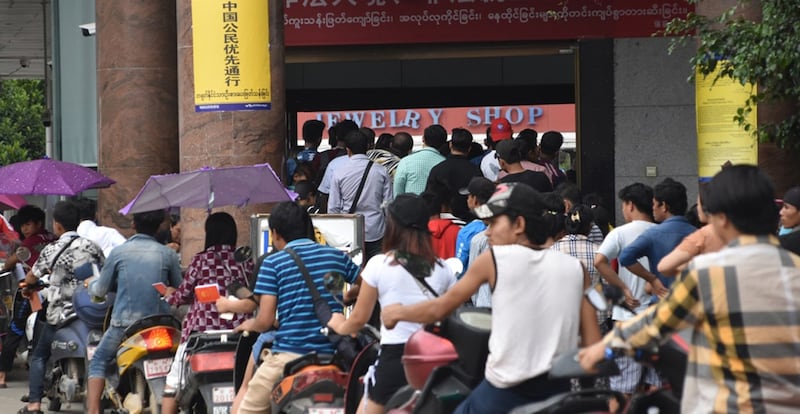About 1,400 migrant workers are entering China from Myanmar every day from the northern Shan state trading hub of Muse after a seven-day permit was recently authorized by Beijing, local residents told Radio Free Asia.
Most of the migrants are from villages in Sagaing, Magway, Mandalay and Shan that have been recently devastated by the civil war, and are in desperate need to earn money, aid workers said. They do menial jobs like gardening or factory work for seven days, and then return home, they said.
“People are rushing for the pass as everybody wants to go,” said Ko Htay, chairman of the Helping Hands Charity Association, which helps border workers.
The single-use temporary border pass, known as a green card, was introduced for workers on Sept. 4. Border authorities in Myanmar’s Muse have been allowing 300 people through Nan Taw gate and 200 people through Sin Phyu gate with the pass everyday – a total of 500 people a day.
China closed entry and exit at the Muse border gates due to the COVID-19 epidemic in 2021.
Earlier this year, it resumed allowing locals from Muse and Namkham townships to enter and exit with a border travel permit – known as a red book. About 900 people have been entering China every day with that permit, Ko Htay said.
Magway resident Kyaw Naing told RFA that he has been waiting in Muse for more than five months to resume the lawn and gardening work he did in China before the pandemic.
“I can’t get a permit as there are too many people,” he said. “I have considered paying some brokers to be able to enter.”

Thousands have applied
The number of people trying to enter China is increasing, according to Ko Htay. About 6,500 people applied for the temporary border pass between Sept. 17 and Sept. 29, he said.
Because some workers are going over to China and then returning within a day or two, authorities should consider giving out a two-day pass instead of a seven-day pass, he said.
“In that way, too many people won’t be lining up like now,” he said.
Those who enter with a temporary border pass have to pay 2,000 Kyats (about US$0.95) at the border immigration office, while those entering with the red book are charged 500 Kyats (about US$0.24).
Some workers obtain the pass even though they don’t yet have work lined up in China, said Kyee Maung, an aid worker for migrants in Shweli.
“It would be more convenient if they had a strong contact for a job. They may face a lot of problems unless they have such a contact,” he said. “Also, if they can’t get out after their card expires, they will be blacklisted by Chinese authorities.”
RFA contacted the Chinese Embassy in Yangon via email to inquire about the thousands of Myanmar migrant workers entering China every day, but received no response.
An administrative official for Muse district said that border immigration issues are being handled by the Immigration Department and couldn’t give specific information about the temporary border pass.
Translated by Myo Min Aung. Edited by Matt Reed and Malcolm Foster .
